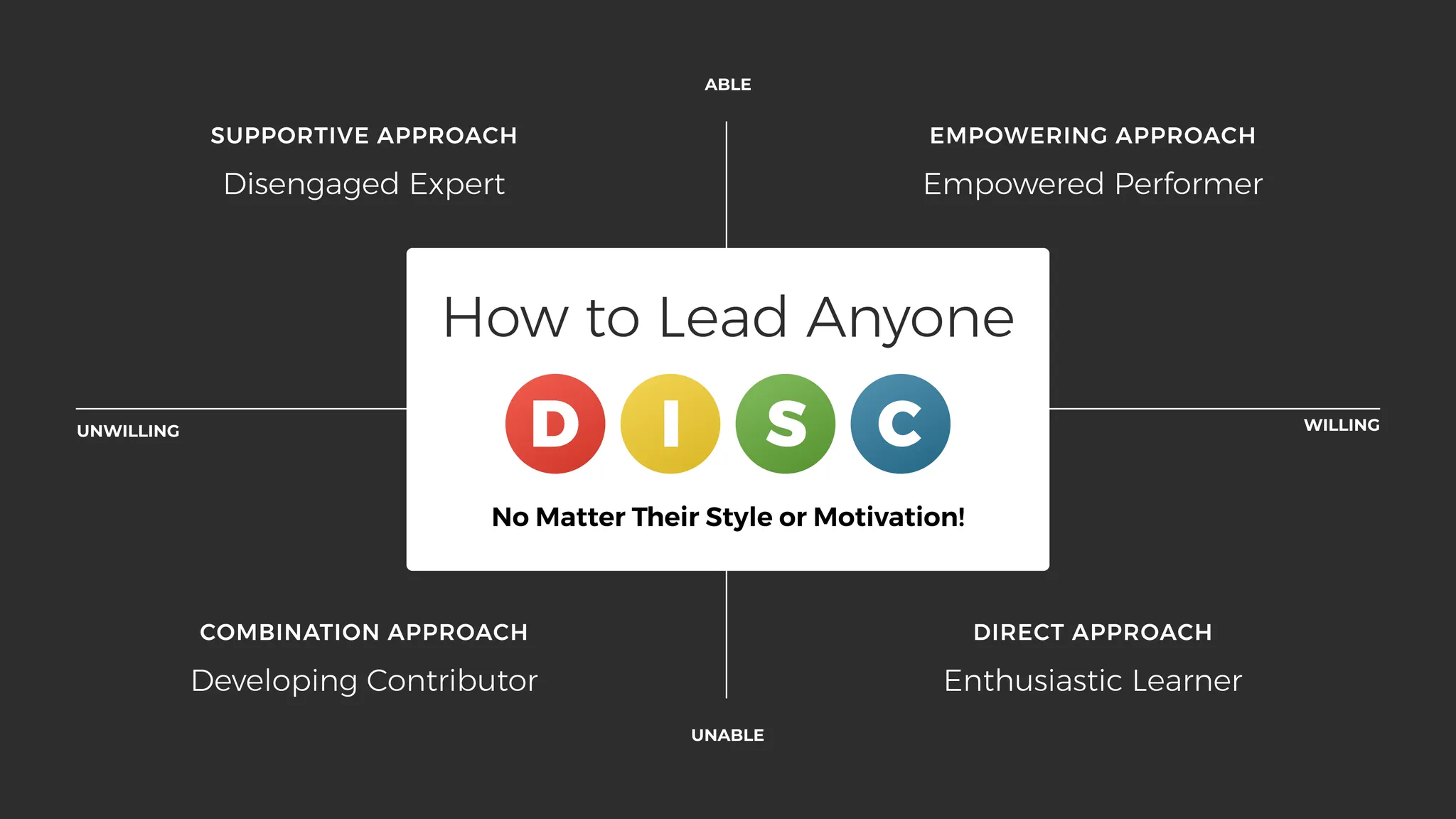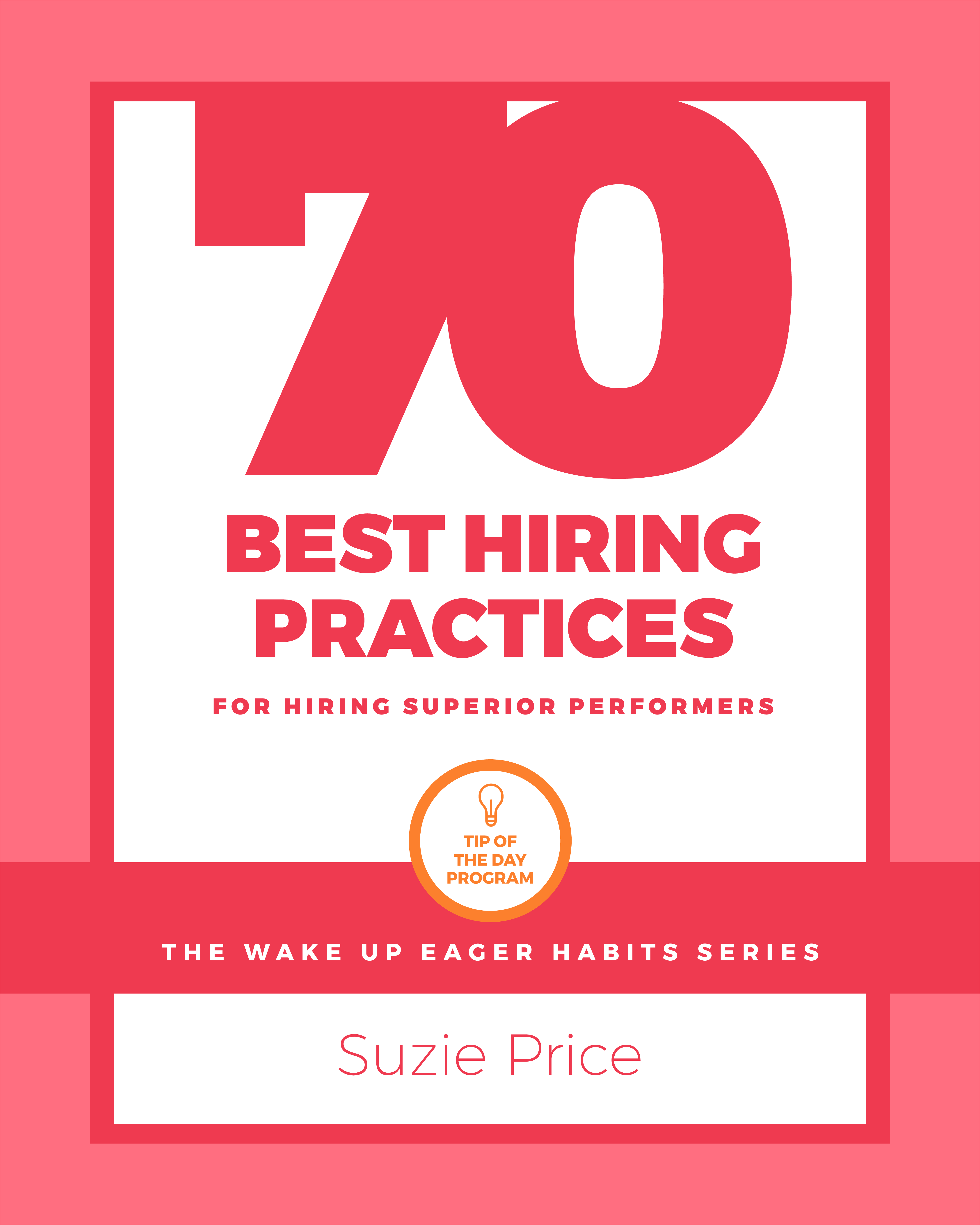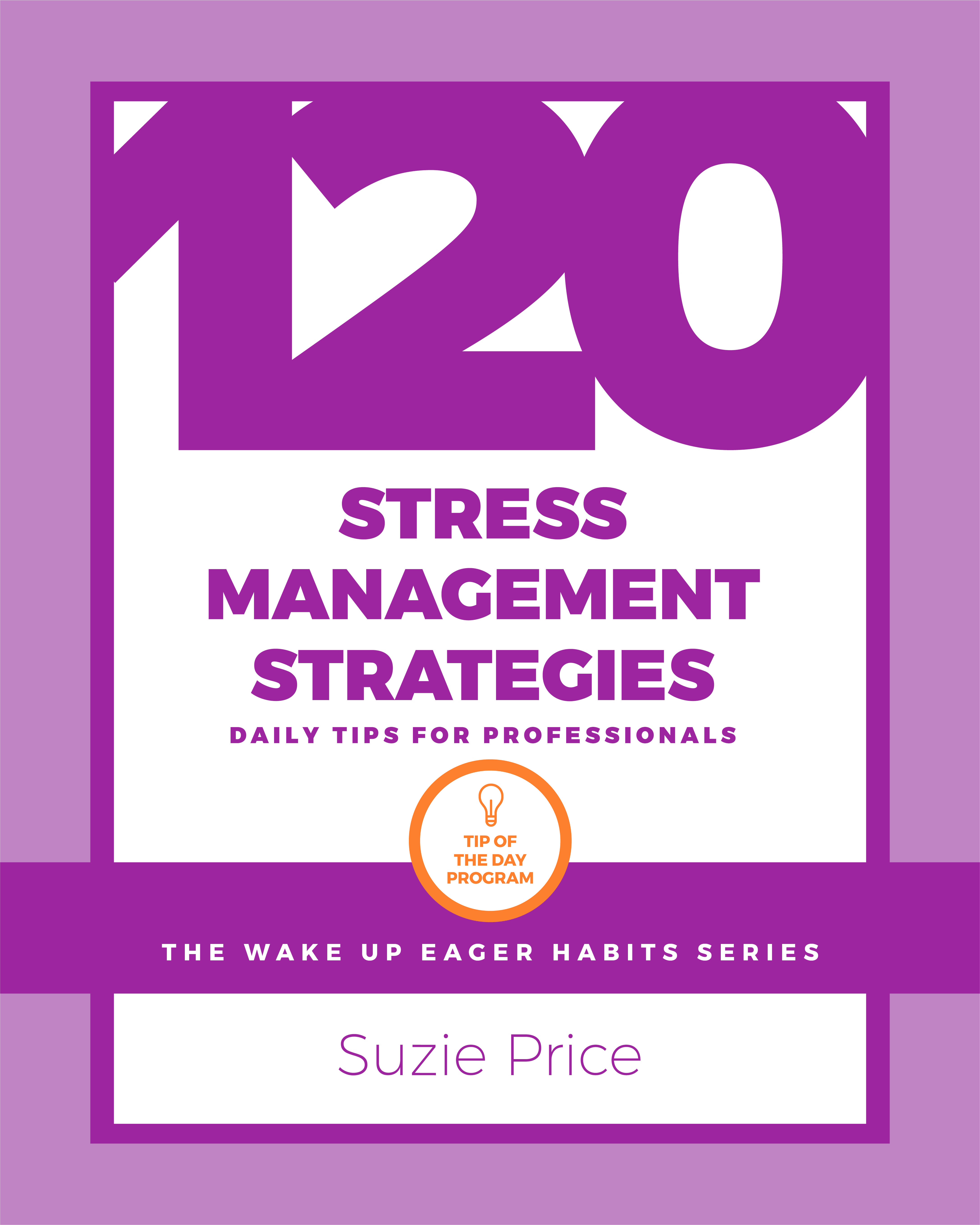The Know How You Need & the Tools to Get You There... Get Certified >

Mini-Episode 9#: How to Lead Every Team Member (No Matter Their Style or Motivation)

In this insightful mini-episode, we break down the powerful intersection of performance and personality—revealing how leaders can guide every team member with clarity and confidence. Using the Able/Willing Map and DISC behavioral styles, our hosts share a practical framework for adapting leadership based on both motivation and ability.
Blending workplace psychology, leadership strategy, and real-world application, this episode highlights why tailored leadership is no longer optional—it’s essential. You’ll discover how understanding someone’s willingness and communication style can unlock trust, increase engagement, and drive performance across every role.
Whether you’re managing high-performers, developing new talent, or reigniting disengaged team members, this episode equips you with six steps to move from generic management to people-first leadership—and build a Wake Up Eager team, one personalized moment at a time.
Key Takeaways from Mini-Episode #9 ---
- Personalization Powers Performance – Effective leadership starts by understanding each team member’s motivation, skillset, and communication style.
- The Able/Willing Map Unlocks Clarity – Assessing both ability and willingness helps leaders identify the right support, coaching, or delegation strategy.
- One Size Doesn’t Fit All – Different combinations of ability and willingness require different leadership approaches for real impact and progress.
- Motivation Has Many Faces – Low willingness can stem from misalignment, burnout, or a lack of purpose—not laziness. Leaders must dig deeper.
- DISC Adds the Human Element – Layering behavioral styles (D, I, S, C) onto performance gives leaders a fuller picture of how to lead and inspire.
- Communication Style Matters – Tailoring your feedback and guidance based on DISC creates more trust, clarity, and connection.
- Leaders Must Adapt – What works for one person may fall flat for another. Adaptability is the hallmark of people-first leadership.
- Engagement Grows With Relevance – When goals and feedback align with an individual’s motivators, performance and enthusiasm skyrocket.
- Confidence Builds Through Coaching – Thoughtful, style-based coaching helps team members grow in both ability and ownership.
- Wake Up Eager Teams Are Built, Not Born – The best teams thrive because their leaders take time to understand, support, and grow each person intentionally.
Episode Transcript:
[00:00:00] Suzie Price : welcome to this wake up eager workforce podcast many episode where we share in 10 minutes or less our monthly article from LinkedIn in a new audio format courtesy of our AI co host as they walk through the article and share additional insights exclusively for you I am Susie Price I'm your podcast host and the founder of Priceless Professional Development and whether you're listening to one of our long form episodes or something like this mini episode our focus is always to provide everything to you related to helping employees in your organization build a high commitment low drama wake up eager workforce we're focused on creating great hiring creating great teams helping leaders and individuals wake up eager you can find all of our episodes long form and short form at Wake up eco workforce.com and you can subscribe anywhere that you get your podcasts so let me know if you have any questions if you are enjoying these mini episodes or any of our other episodes or if I can help you in any way you can find me at Susie at priceless professional.com Susie Price on LinkedIn and of course our contact information if you go to wake up eager workforce.com thanks for tuning in appreciate you very much and go out and have a wake up eager kind of day take care
[00:01:23] AI 1 : have you ever been in this situation you give the same feedback maybe the same task to two different people on your team and you get completely different results like one person just runs with it fries and the other one well they seem to deflate or maybe they just get lost it's a really common frustration I think and if you're leading a team you definitely know that this whole one size fits all leadership idea it just doesn't cut it the truth is you know effective leadership isn't just about managing the tasks it's really about deeply understanding and empowering each unique person on your team helping them have more of those you know wake up eager days we talk about so how do we actually bridge that gap how do we get from that sort of generic management style to truly tailored leadership that works for everyone today we're diving deep into exactly that we'll look at some foundational concepts first and then layer on some really powerful insights into individual styles
[00:02:16] AI 2 : yeah our mission here really is to give you a kind of personalized roadmap we're gonna break down how you can motivate how you engage and genuinely lead each team member in a way that works for them because I mean the source material is pretty clear on this that old one size fits all approach to performance it's just well it's out definitely out
[00:02:35] AI 1 : okay alright so let's start with a tool that I think cuts through a lot of the guesswork it's called the able willing map hmm it's actually a brilliant way to assess your team members whether it's for a specific task or even you know that their overall role it really boils down to two crucial dimensions first up there's ability yeah do they actually have the confidence the skills the knowledge they need to do the task successfully and then just as critical there's willingness do they have the motivation the right attitude the commitment do they actually want to do the task it sounds almost deceptively simple right but getting this piece right really sets your entire strategy
[00:03:11] AI 2 : it absolutely does and this initial assessment is Paramount because where someone lands on this map well it dictates your foundational management approach so for instance if you've got someone who's high ability high willingness we call them the empowered performer they've truly you know got this your main job as a leader here is basically delegating trusting them completely maybe removing roadblocks and of course celebrating their successes honestly your biggest mistake here might be micromanaging them
[00:03:40] AI 1 : right getting in their way
[00:03:41] AI 2 : exactly then you might have the disengaged expert these are folks with high ability but low willingness they absolutely know how to do the job but maybe they're lacking motivation or interest or perhaps a sense of purpose at least for this specific task with them your role shifts dramatically you really need to listen listen deeply try to understand their disconnect you need to encourage them maybe help reframe the task to find that lost purpose and inspire them to reengage
[00:04:09] AI 1 : okay that makes sense what about the other side
[00:04:11] AI 2 : right so next we see the enthusiastic learners these are the people with high willingness but low ability they're eager they really want to do the task but they just need guidance they need clear instructions because they don't have the specific skills or knowledge yet so your job with them it's teaching patiently guiding clarifying every step along the way
[00:04:33] AI 1 : lots of support there
[00:04:34] AI 2 : definitely and finally you've got the developing contributor this is someone with say partial ability partial willingness they're getting there making progress but they need a thoughtful blend of both guidance and encouragement your role here is really coaching them closely maybe collaborating on solutions and actively building their confidence as they pick up both the skill and the motivation
[00:04:55] AI 1 : that able willing map wow it immediately clarifies your sort of strategic starting point doesn't it yeah but managing tasks that's only half the battle isn't it I mean what happens when you've got two people who are both say high willingness low ability like two enthusiastic new hires yeah but they respond completely differently to your guidance you know one thrives with public praise the other just shrinks back that's where we need to layer on their unique communication styles their working styles maybe using something like the d I
[00:05:24] AI 2 : s C framework absolutely that's the next critical layer understanding their core motivations their behavioral tendencies through dice that allows you to customize your leadership approach even further makes it truly personal so let's start with the d dominance style we call them the results oriented driver these individuals they're motivated by challenges by achieving quick results and importantly by having autonomy
[00:05:46] AI 1 : okay so let's play this out if you have a d style person who is maybe a developing contributor so high willingness but still learning low ability to wideny how do you coach them how do you do that without you know stifling that natural drive they have for autonomy do you risk overwhelming them if you just like cut to the chase and expect them to figure it all out
[00:06:07] AI 2 : yeah that's a really critical point with a developing contributor d you still give clear concise results oriented tasks that stays but your coaching focuses more on setting ambitious goals defining clear boundaries and then empowering them to take charge of the execution within those boundaries you might provide resources sure but you let them experiment with the how let them figure it out even if they make some initial mistakes that sense of independence is crucial for them you wanna frame challenges as opportunities right opportunities for their leadership and decisive action to make a big difference connect it to winning
[00:06:41] AI 1 : uh connecting it to winning
[00:06:43] AI 2 : okay exactly now what if you have a d who's a disengaged expert high ability low willingness their low willingness might actually stem from feeling micromanaged or maybe they don't see a clear path to making an impact or they just lack that autonomy they crave so you need to re empower them clearly outline what's at stake define the ultimate what and then really give them the space to figure out the how you've got to acknowledge their competitive drive too and maybe show how strategic collaboration could actually amplify the results not hinder them
[00:07:13] AI 1 : hmm okay that clearly outlines the approach for the d yeah how does this compare to say motivating and influence style hmm the enthusiastic communicator mm hmm these are the people that often motivated by relationships social interaction getting recognition and inspiring others right
[00:07:30] AI 2 : that's them with an eye style you want to use high energy positive enthusiastic communication it feeds their style so if you have an empowered performer eye someone high on both ability and willingness you celebrate their milestones publicly create lots of opportunities for collaboration teamwork emphasize how their positivity and influence can really lift the whole group
[00:07:49] AI 1 : okay but what if you have an eye who is a developing contributor still enthusiastic but maybe lacking some of the detailed follow through I can kind of see that their enthusiasm might make them jump from idea to idea without quite finishing things
[00:08:02] AI 2 : is that the trap that is often the trap yeah not providing enough structure well you absolutely wanna encourage their creative problem solving and brainstorming that's their strength you also need to gently but firmly maintain clear expectations and timelines keep them grounded breaking tasks down into engaging manageable actions can really help and for a disengaged expert I hmm
[00:08:25] AI 1 : high skill low willingness maybe they feel isolated
[00:08:27] AI 2 : could be their low willingness might come from feeling isolated or maybe unappreciated you need to reignite their purpose give them opportunities to mentor others lead initiatives that really require their people skills or maybe be the public face of certain projects let them shine and reconnect with people that often does the trick
[00:08:45] AI 1 : make sense let them shine okay then we have the s steadiness style the harmonious collaborator these team members are motivated more by harmony dependability security supporting the team how do we tailor things here
[00:09:00] AI 2 : right with an s style your approach needs to be calmer think one on one guidance emphasizing steady reliable progress for an empowered performer s your goal is really ensuring stability for them it's crucial to avoid sudden jarring changes that disrupt their rhythm especially without plenty of notice
[00:09:18] AI 1 : so changes need careful handling
[00:09:20] AI 2 : very careful handling if change is necessary ease them into it clear consistent communication lots of advance notice ongoing empathetic support maybe even involve them in planning the change process now for developing Contributor s you build their confidence by consistently acknowledging their reliability their loyalty their commitment to team cohesion provide lots of reassurance they need a safe stable space to learn and grow
[00:09:42] AI 1 : so following that logic if an s is a disengaged expert they know the job but their willingness is low could that disengagement come from say a feeling of instability or maybe a disruption to team harmony
[00:09:55] AI 2 : exactly that's often the root cause they might be struggling with conflict on the team or sudden shift in direction or maybe just a lack of feeling supported so your role becomes providing reassurance creating a sense of security again and really highlighting their crucial role as the backbone of the team reinforce how important their stability their quality focus their support is for everyone you focus on restoring that predictability and their sense of belonging
[00:10:21] AI 1 : okay predictability and belonging got it got finally we move to the C conscientious style the detail oriented thinker these are the individuals motivated by accuracy quality logic sticking to high standards and processes
[00:10:33] AI 2 : precisely so for a C style your approach involves providing detailed instructions really clear metrics and logical explanations for why things are done a certain way if you have an empowered performer C you foster collaboration by validating their thoroughness their analytical contributions explain exactly how their precision enhances the team's overall success offer them well structured problem solving frameworks encourage their participation in detailed planning and analysis basically give them the data they crave
[00:11:02] AI 1 : okay but what if a C is a disengaged expert hmm high scale low willingness that seems like a fascinating scenario their disengagement might stem from seeing I don't know a flaw in the process or maybe a lack of logical consistency
[00:11:16] AI 2 : is that it that's very often it for a disengaged expert c their low willingness frequently comes from perceived lack of logic or accuracy in a task or maybe a deviation from established processes that they see as critical so you need to engage them by actually providing more data inviting their critical analysis of the issue and showing them how their meticulous work can directly solve the problem or help achieve higher standards you build their confidence by demonstrating how their precision isn't just valued it's absolutely critical for the team's overall success
[00:11:48] AI 1 : validating their core need for accuracy
[00:11:50] AI 2 : exactly and for a developing contributor C you empower them by giving them the space the time to research analyze perfect processes independently ensure they have all the necessary data and really clear quality expectations you emphasize the critical impact their accurate high quality work has on achieving those larger team objectives let them own that quality piece
[00:12:11] AI 1 : wow bringing this all together what does it really mean for you the leader listening right now it's clearly not just about managing cast in the war it's about unlocking the genuine potential of each person on your team this whole framework it seems to guide you in creating an environment where people respond positively not just to the work but to your leadership too which leads hopefully to more of those wake up eager days we're aiming for
[00:12:34] AI 2 : exactly and implementing this effectively it really involves let's say 6 key steps first evaluate ability and willingness for each key task or project you need to honestly assess where each individual truly falls in that able willing quadrant ask yourself the tough questions are they genuinely willing but just lacking a specific skill or are they highly skilled but feeling disengaged from this particular task you need to be brutally honest with yourself here okay
[00:13:00] AI 1 : honest assessment first what's step two
[00:13:02] AI 2 : step 2 identify DISC styles and more the source material specifically mentions using comprehensive tools like trimetrix for example to deeply understand not just their natural behavioral tendencies that's the dice part man but also their core motivators what drives them and even how they think they're acumen they're sort of mental processing and decision making style this gives you the full richer picture way beyond just surface behavior
[00:13:29] AI 1 : DISC is part of a potentially bigger picture got it step three
[00:13:33] AI 2 : step 3 customize your approach now you have clarity on both their ability and willingness DISC STYLE so you consciously pair the right able willing strategy with their specific behavioral preferences this is where you get really targeted really effective performance management this is sort of where the magic of this deep dive comes alive you know yeah
[00:13:51] AI 1 : where it all connects okay step 4
[00:13:53] AI 2 : fourth set clear personalized goals define success metrics that yes align with the organizational goals but also resonate with their individual strengths and motivators engagement really soars when goals feel personally relevant when they connect to how people naturally operate it makes the work feel less like a chore maybe more like a calling
[00:14:13] AI 1 : personal relevance is key alright step five
[00:14:16] AI 2 : fifth provide tailored feedback this is absolutely crucial you need to use their disc style to shape not just how you give constructive feedback but also how you celebrate their achievements remember our examples a d might want direct results focused praise maybe privately with data to back it up an I often wants public acknowledgment Celebration an s wants that quiet reassurance and recognition for their reliability their support and a C wants specific recognition for accuracy thoroughness the quality of their meticulous work providing feedback in a way that actually resonates with them is key to them truly hearing it and being able to act on it
[00:14:53] AI 1 : tailoring the feedback delivery yeah OK makes total sense and the last step
[00:14:56] AI 2 : and finally step 6 adapt and evolve look people grow roles change projects shift and willingness that can fluctuate based on countless factors inside and outside of work so it's crucial to regularly reassess their ability and willingness stay attuned to how their role is evolving within the team and also within their own career aspirations this isn't a one time assessment you stick in a file it's an ongoing dynamic conversation that needs to evolve right along with the person an ongoing conversation I like that so okay let's circle back to our original challenge then yeah why does your best advice for one person totally miss the Mark for another it's because effective leadership really demands this is granular understanding of each individual doesn't it when leaders actually take the time to deeply understand both the capacity the ability and the motivation the willingness of their team members and then layer on their unique behavioral styles like DISC well that's when you create an environment where everyone feels understood feels valued and feels genuinely excited to contribute their best and that leads to more of those wake up eager days not just for them probably for you as a leader too that really is the ultimate takeaway here the old one size fits all approach to performance management it's truly out because it just ignores the human element completely your team is made up of unique individuals and their ability and willingness combined with their DISC behavioral styles those are your secret weapons really for unlocking their absolute best
[00:16:18] AI 1 : so here's a thought to leave you with consider one team member you lead right now today how might understanding their specific ability the willingness for a key task and their DISC style how might that immediately shift your very next interaction with them and what specific wake up eager moment could that more nuanced more personalized approach create for them and ultimately for your whole team
|
Connect with Suzie:
- LinkedIn: Suzie Price
- LinkedIn: Priceless Professional Development
- LinkedIn: Wake Up Eager Workforce Podcast
PRICELESS RESOURCES
PODCAST: Subscribe to our Podcast or Help Us and Leave a Review
NEWSLETTER: Sign up for Monthly Email Updates
PODCAST: Most Recent Episodes Directory of All Episodes
RELATED DEVELOPMENT SERVICES:
- Certification: Become the Expert: Assessment Certification Training
- Hiring: Hiring: Secret to Superior Performance
- TriMetrix Training Programs and Resources for Leaders and Consultants
- Complimentary Consulting Call or Send Us Feedback: Contact Suzie





